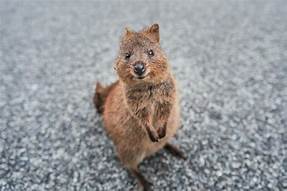Can I Have a Quokka as a Pet?
Quokkas are adorable marsupials native to Western Australia. With their friendly nature and distinct smiles, they have become popular internet sensations. As a result, many people are interested in keeping quokkas as pets. However, there are several important factors to consider before making this decision.

Legal Considerations
1. Protected Species: Quokkas are protected under Australian law. It is illegal to capture, keep, or export them without a permit. Permits are only issued for specific purposes, such as conservation, research, or education.
2. Habitat Requirements: Quokkas need a large, natural habitat to thrive. They require access to open grasslands, dense vegetation, and fresh water. Recreating these conditions in a home environment is challenging.
Health and Safety
1. Specialized Diet: Quokkas have specialized dietary needs. They primarily eat leaves, stems, and fruits of native Australian plants. Providing them with these specific foods in captivity can be difficult.
2. Social Needs: Quokkas are social animals that live in colonies. Keeping a single quokka as a pet can cause loneliness and distress.
3. Health Risks: Quokkas are susceptible to various diseases and parasites. These can spread to other animals and humans, posing a health risk.
Behavioral Considerations
1. Nocturnal Activity: Quokkas are nocturnal, meaning they are most active at night. This may disrupt your sleep patterns if you keep them as pets.
2. Destructive Behavior: Quokkas are known for chewing and digging. They may damage furniture, walls, and other household items.
3. Escaping Behavior: Quokkas are agile and resourceful. They may escape from their enclosures if not properly secured.
Conclusion
Keeping a quokka as a pet is not recommended. They are wild animals with unique needs that cannot be fully met in captivity. Additionally, legal, health, and behavioral issues make them unsuitable for the average pet owner. If you want to experience the joy of interacting with quokkas, consider visiting a wildlife sanctuary or supporting conservation efforts.
Declaration: All article resources on this website, unless otherwise specified or labeled, are collected from online resources. If the content on this website infringes on the legitimate rights and interests of the original author, you can contact this website to delete it.




